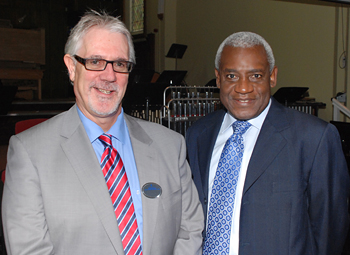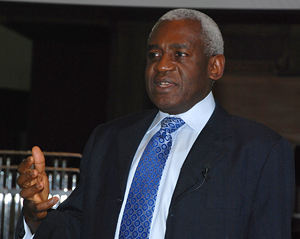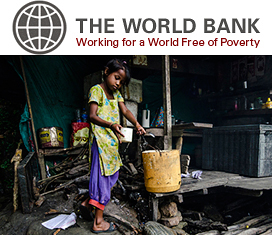World Bank aims to slash world poverty to a minimum by 2030
Tue, 29 Oct 2013 12:55:00 GMT
World Bank director Dr Cyprian Fisiy welcomed to Huddersfield by the Centre for Communication and Consultation Research
 Dr Cyprian Fisiy is pictured with lecturer Keith Butterick who is part of the Centre for Communication and Consultation Research (HCfCCR), at the University of Huddersfield.
Dr Cyprian Fisiy is pictured with lecturer Keith Butterick who is part of the Centre for Communication and Consultation Research (HCfCCR), at the University of Huddersfield.
ONE of the most senior figures in the World Bank paid a special visit to the University of Huddersfield and outlined an ambitious target to slash levels of global poverty to a bare minimum by the year 2030.
“It is a very tight deadline,” admitted Dr Cyprian Fisiy, but it had been set in order to concentrate the minds of people working in the field of poverty reduction, he said. The aim is that within 17 years, just three per cent of the world’s population would suffer extreme poverty – defined as less than $1.25 a day. Currently, according to the World Bank, some 14 per cent, or one billion of the global population are mired in poverty.
Cameroon-born Dr Fisiy is Director of the Social Development Department of the World Bank, where he has worked since 1994. During his visit to Huddersfield, which included a lecture to students, he explained that consultation with socially-marginalised groups was one of the tactics that would be used during the drive to eradicate poverty.
 The University of Huddersfield is becoming a key centre in the field of consultation, and is home to a newly-established Centre for Communication and Consultation Research (HCfCCR), which has close links with the London-based Consultation Institute. Dr Fisiy was in the UK to deliver a keynote lecture at an event to celebrate the Institute’s tenth anniversary and before this he came to Huddersfield to hold talks with members of the HCfCCR. He was accompanied by Rhion Jones, Programme Director of the Consultation Institute, who introduced Dr Fisiy’s lecture, entitled How the World Bank helps to eradicate poverty: An up to date perspective. (See Dr Fisiy's full lecture below).
The University of Huddersfield is becoming a key centre in the field of consultation, and is home to a newly-established Centre for Communication and Consultation Research (HCfCCR), which has close links with the London-based Consultation Institute. Dr Fisiy was in the UK to deliver a keynote lecture at an event to celebrate the Institute’s tenth anniversary and before this he came to Huddersfield to hold talks with members of the HCfCCR. He was accompanied by Rhion Jones, Programme Director of the Consultation Institute, who introduced Dr Fisiy’s lecture, entitled How the World Bank helps to eradicate poverty: An up to date perspective. (See Dr Fisiy's full lecture below).
Dr Fisiy began by outlining the evolution of the World Bank, originally set up in the aftermath of WWII to supervise the rebuilding of wrecked infrastructure in Europe and Japan. By the 1960s, the Bank had moved into a new phase, waging war on global poverty. At this stage, economists played the key role, but when the Bank’s role began to include economic and environmental sustainability, social scientists began to be employed in larger numbers.

Photo by Amitava Chandra/World Bank.
In 1997, a Social Development Department was established and the defining mission of the Bank, when it engaged with people, was “do no harm”, said Dr Fisiy.
The Department’s 204 staff were a fraction of the thousands employed by the World Bank, but they were the biggest concentration of social scientists anywhere in the world. Dr Fisiy described the evolving policies of the World Bank as it strove to eradicate poverty. They included strategies such as consultation, especially with ethnic minorities and socially-marginalised groups, plus issues such as social inclusion and social resilience – the way that societies bounced back after a shock to the system such as environmental disaster.
Dr Fisiy talked about the importance of human dignity and he recounted a visit to a part of India, where members of the “Untouchable” caste preferred to suffer illness in their own homes rather than visit a well-equipped clinic because when they did so they were treated with disrespect.
Social cohesion was another important theme. Where it was not present, said Dr Fisiy, violence and conflict – symbolised by a shaken fist – were the result.
“The big challenge for us is how to convert the fist into a handshake,” he added.
Dr Fisiy explained that that the dominant philosophy of the World Bank was that economic benefits from market reforms would tickle down to the poor. By contrast, the Social Development Department that he heads believed in “bottom up” development.
After his lecture, Dr Fisiy fielded a sequence of questions, many of them from international students. He was thanked by the Dean of the University’s School of Media, Music and Humanities, Professor Martin Hewitt.







